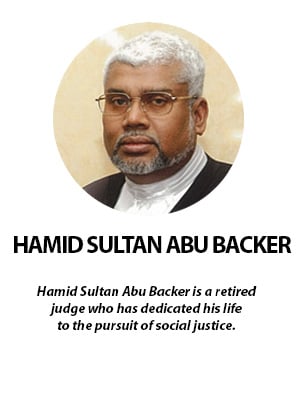
In my previous article, I had said that those whose self-interests are compromised are bound to hate any person who speaks the truth, and will move to fix or destroy him.
Nonetheless, staying true to my oath of office compelled me to become a whistleblower judge.
Unfortunately, I was retired without a promised Royal Commission of Inquiry (RCI). Media reports at the time claimed that “past” and “present” members of the judiciary had met the prime minister to put a stop to it.
There were countless occasions during my time in office when I observed a lack of ethics among members of the legal industry.
For instance, I had the misfortune of knowing one member of the legal industry who had confessed to purchasing a kidney from a poor young Tamil Muslim in Sri Lanka, where the transplant was performed.
I am not sure if it is proper for such a person to continue serving the legal industry, but it was indeed traumatic news to me. I make this point simply to demonstrate how unethical members of the legal industry can behave even in their personal lives.
Unfortunately, the prevalent culture among the Malays is that they do not take kindly to criticism of their leaders, much less their prosecution in a court of law.
One way that will contribute to a change in that culture is to remove the trying of facts from the courts.
Ultimately, the key to defending the rights of all Malaysians is to ensure that the Malays, who lead and dominate the legal industry, have a full grasp of all areas of the law. This, however, cannot be achieved through a proliferation of single degree holders across the legal industry.
On the prosecution of Malay leaders, I have previously suggested that it must be preceded by an RCI to ensure continued political and economic stability. I will not belabour the point here save to say that the wanton prosecution of Malay leaders will not benefit Malaysians.
Alternatively, since the prime minister is a constitutional appointment at the very highest level, the law should require the Attorney-General to secure the approval of the Malay Rulers before a sitting or former prime minister can be charged for acts done while in office.
Over the last four years or so, Malaysia has seen several ex-PMs charged or threatened with criminal proceedings. This vicious development is not constitutionally correct. It also threatens the security of the nation.
One of our prime ministers was sent to prison just over a year ago, but his party’s senior leaders are still complaining publicly about the process. Some of that criticism appears to me to be quite justified.
Najib Razak’s trial has seen many controversies.
From the very beginning I wondered why a senior judge was not appointed to hear the case. The court’s past practice in prominent cases was to assign them to senior judges.
In one instance, the late Gopal Sri Ram, then a Court of Appeal judge, was sent to the High Court to hear a case. In another, a great judge of exemplary distinction was sent to a different state to preside over another high profile case.
Next, I was not inspired by the fact that the Federal Court registry had fixed Najib’s appeal for hearing even before his appeal to be represented by a Queen’s Counsel had been heard and exhausted.
I also found the response from the stakeholders of justice on issues relating to the trial judge’s alleged conflict of interest amid media reports of the findings made by the MACC most uninspiring.
In addition, I was baffled by the availability of a draft of the grounds of judgment even without the appellant being properly heard as required under section 92 of the Courts of Judicature Act 1964, and before the appeal had concluded.
I was also very disappointed to learn of media statements by prominent members of the legal fraternity asserting pressure on the court not to grant a request by Najib’s lawyers for an adjournment, especially given that the hearing was before a coram of the Federal Court.
Najib’s lead counsel, Hisyam Teh Poh Teik, had appeared before me in the Court of Appeal on several occasions. He is one of the finest gentlemen at the bar and a knowledgeable criminal practitioner with vast experience. It was quite heartbreaking to hear the unkind words hurled at him.
Najib effectively ended up with no counsel to defend him, a denial of his constitutional right.
All in all, the facts of Najib’s case and the adjournment point were matters that I will say are unprecedented in Malaysian legal history.
I was extremely relieved that one Federal Court judge in the review application had the judicial mind to appreciate the concept of procedural fairness. His is an historic and powerful judgment which is bound to receive greater appreciation over time.
Although I did not agree with what the judge said on sentencing, those comments in the circumstances of Najib’s case appear to be of no great value.
Indeed, the dissenting judgment may have a significant impact in Najib’s application for pardon.
In a nutshell, the legal industry must be populated by ethical persons who are knowledgeable in law to protect the constitutional rights of all who come before the courts. - FMT
The views expressed are those of the writer and do not necessarily reflect those of MMKtT.


No comments:
Post a Comment
Note: Only a member of this blog may post a comment.